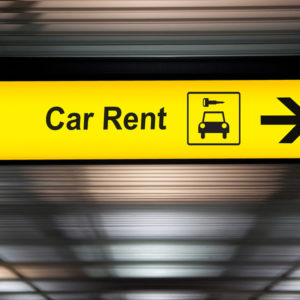The holidays are in full swing and, and if you’re like millions of Americans you’ll be dealing with the joys and headaches of traveling through the nation’s airports this season. Peak season is always particularly hard on air travel, in part because of difficulties involving ground transportation to and from their destinations. Drop-off areas get congested, parking lots can be vast, and not every rental car company is allowed to serve the airport.
For travelers, these kinds of complications make visiting family over the winter holidays extra inconvenient, confusing or both. This doesn’t need to be the case. Airport managers control on-site ground transportation, and improving how they regulate rental car access would make traveling easier for all.
The crux of the problem stems from changing demand for different types of ground transportation intersecting with the changing nature of the rental car market. As transportation network companies have revolutionized how people get to and from the airport, demand for airport parking has weakened, opening holes in airport authority budgets.
The good news is that what feels like a curse could offer a wave of opportunity for airports that now have underused land nearby. Forward-thinking airport officials can repurpose these properties, and rental car companies stand in an ideal position to fill them.
The last decade has witnessed the advent of new peer-to-peer rental firms that operate platforms for renting vehicles directly from car owners. Yet while peer-to-peer firms benefit from not being subject to some of the taxes and fees that traditional rental car companies must endure, more traditional firms enjoy the privilege of airport access — one of the most important opportunities for rental car businesses.
As it stands, most airports have ambiguous definitions about what constitutes a rental car company and what rules apply to companies renting cars that want to have airport-based facilities. In the past, clarity in rental car facility access fees and regulations was mostly unnecessary; new entrants were few, and airport authorities could negotiate agreements on an as-needed basis.
But that’s no longer the case. The rise of peer-to-peer car rental platforms has ushered in a wave of new companies that facilitate what are fundamentally car rental transactions, even if they differ in internal organization and structure from legacy rental car firms.
In a market where new firms enter regularly, setting airport fees and access rules on an as-need basis poses problems. The price of scarce airport landside space remains ambiguous. An entrepreneur that has an idea for how to rent cars at airports can’t easily develop a business plan when they don’t know whether access will be costly — or even allowed at all. This chills competition, robbing travelers of more options while setting high barriers for new companies to access important government-owned transportation hubs.
On the flipside, firms that already enjoy airport access are often subject to a host of rules and fees that new upstarts are avoiding by being outside the formal airport-access system, ranging from fees to what types of cars may be rented to how the company is staffed. These rules impose costs that distort the airport ground transportation market in unpredictable ways.
Thankfully, there’s a straightforward policy solution to the problem of uneven or ambiguous airport access rules and fees: Airport authorities can work to balance the competing interests of new and traditional companies by adopting an open posture toward new types of rental firms and ensuring that the fees and rules for each firm seeking to access airport property are consistent and equitable.
More specifically, airport authorities should work to set simple, transparent regulations and airport access fees that are available to the public in advance. This would limit the unpredictability inherent in a discretionary system that operates on unclear rules. Where airport authorities lack clarity in what types of transactions they may regulate, state lawmakers could pass laws to reinforce their power to set reasonable rules and fees for all firms seeking to facilitate any type of rental car transactions.
Getting the most out of government airport facilities is the main task of airport management. Clear, equitable rules and limited-but-formal regulations governing ground transportation are the best answer for doing so.

